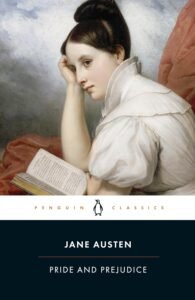“Pride and Prejudice” by Jane Austen is one of the most beloved novels in English literature, telling the story of Elizabeth Bennet, a witty and intelligent young woman, and her complex relationship with the wealthy and aloof Mr. Darcy.
Set in the early 19th century, the novel explores themes of class, marriage, and social expectations as Elizabeth navigates the pressures of society and her growing feelings for Darcy. Austen’s sharp social commentary, memorable characters, and exploration of love and self-discovery have made “Pride and Prejudice” a timeless classic.

Key Takeaways:
1. Social Class and Marriage: The novel explores the role of social class in marriage and relationships, highlighting the limitations and expectations placed on individuals, particularly women, in Regency-era England. The characters’ decisions are often influenced by considerations of class and social standing.
2. Prejudice and First Impressions: One of the central themes is the danger of prejudice and the importance of looking beyond first impressions. Both Elizabeth and Darcy must overcome their initial judgments of each other to find true understanding and love.
3. The Complexity of Love: Austen portrays love as a complex and multifaceted emotion, influenced by societal pressures, personal pride, and misunderstandings. The novel emphasizes the importance of mutual respect, communication, and personal growth in romantic relationships.
4. The Role of Family: The Bennet family dynamic plays a significant role in the story, with Elizabeth’s relationships with her sisters and parents influencing her decisions. The novel examines the impact of family on one’s choices and the importance of familial support and loyalty.
5. Austen’s Social Commentary: Through her characters and plot, Austen offers a critique of the social norms and expectations of her time, particularly regarding marriage, gender roles, and class. Her witty and incisive commentary continues to resonate with readers today, making “Pride and Prejudice” both a love story and a reflection on society.






Discussion about this post